
A hymn is a type of song, usually religious, specifically written for the purpose of adoration or prayer, and typically addressed to a deity or deities, or to a prominent figure or personification. The word hymn derives from Greek ὕμνος (hymnos), which means "a song of praise". A writer of hymns is known as a hymnist. The singing or composition of hymns is called hymnody. Collections of hymns are known as hymnals or hymn books. Hymns may or may not include instrumental accompaniment.
A doxology is a short hymn of praises to God in various forms of Christian worship, often added to the end of canticles, psalms, and hymns. The tradition derives from a similar practice in the Jewish synagogue, where some version of the Kaddish serves to terminate each section of the service.

Love Divine, All Loves Excelling is a Christian hymn by Charles Wesley with a theme of "Christian perfection." Judging by general repute, it is among Wesley's finest: "justly famous and beloved, better known than almost any other hymn of Charles Wesley." Judging by its distribution, it is also among his most successful: by the end of the 19th century, it is found in 15 of the 17 hymn books consulted by the authors of Lyric Studies. On a larger scale, it is found almost universally in general collections of the past century, including not only Methodist and Anglican hymn books and commercial and ecumenical collections, but also hymnals published by Reformed, Presbyterian, Baptist, Brethren, Seventh-day Adventist, Lutheran, Congregationalist, Pentecostal, and Roman Catholic traditions, among others including the Churches of Christ. Specifically, it appears in 1,328 of the North American hymnals indexed by the online Dictionary of North American Hymnology, comparable to Newton's "Amazing Grace" (1,036), Wesley's "O for a Thousand Tongues" (1,249), and Watts' "When I Survey the Wondrous Cross" (1,483), though still well short of Toplady's "Rock of Ages" (2,139) or Wesley's own "Jesu, Lover of my Soul" (2,164).

"A Mighty Fortress Is Our God" is one of the best known hymns by the reformer Martin Luther, a prolific hymnodist. Luther wrote the words and composed the melody sometime between 1527 and 1529. It has been translated into English at least seventy times and also into many other languages. The words are a paraphrase of Psalm 46.
"Old 100th" or "Old Hundredth" is a hymn tune in Long Metre from Pseaumes Octante Trois de David (1551) and is one of the best known melodies in all Christian musical traditions. The tune is usually attributed to the French composer Louis Bourgeois.

"O for a Thousand Tongues to Sing" is a Christian hymn written by Charles Wesley. Charles Wesley wrote over 6,000 hymns, many of which were subsequently reprinted, frequently with alterations, in hymnals, particularly those of Methodist churches.
"The Spirit of God Like a Fire Is Burning" is a hymn of the Latter Day Saint movement. It was written by W. W. Phelps, one of the most prolific hymnwriters of early Mormonism.

Psalm 103 is the 103rd psalm of the Book of Psalms, generally known in English by its first verse, in the King James Version, "Bless the LORD, O my soul". The Book of Psalms is part of the third section of the Hebrew Bible, and a book of the Christian Old Testament. In the Greek Septuagint version of the bible, and in its Latin translation in the Vulgate, this psalm is Psalm 102 in a slightly different numbering system. In Latin, it is known as "Benedic anima mea Domino". The psalm is a hymn psalm.

"Eternal Father, Strong to Save" is a British hymn traditionally associated with seafarers, particularly in the maritime armed services. Written in 1860, its author William Whiting was inspired by the dangers of the sea described in Psalm 107. It was popularised by the Royal Navy and the United States Navy in the late 19th century, and variations of it were soon adopted by many branches of the armed services in the United Kingdom and the United States. Services who have adapted the hymn include the Royal Marines, Royal Air Force, the British Army, the United States Coast Guard and the United States Marine Corps, as well as the navies of many Commonwealth realms. Accordingly, it is known by many names, variously referred to as the Hymn of Her Majesty's Armed Forces, the Royal Navy Hymn, the United States Navy Hymn, and sometimes by the last line of its first verse, "For Those in Peril on the Sea". The hymn has a long tradition in civilian maritime contexts as well, being regularly invoked by ship's chaplains and sung during services on ocean crossings.
Johann Sebastian Bach composed the church cantata Wär Gott nicht mit uns diese Zeit, BWV 14, in Leipzig in 1735 for the fourth Sunday after Epiphany and first performed it on 30 January 1735, a few weeks after his Christmas Oratorio. The cantata, in Bach's chorale cantata format, is based on Martin Luther's hymn "Wär Gott nicht mit uns diese Zeit". Its text paraphrases Psalm 124, focussing on the thought that the believers' life depends on God's help and is lost without it.
"For the Beauty of the Earth" is a Christian hymn by Folliott S. Pierpoint (1835-1917).
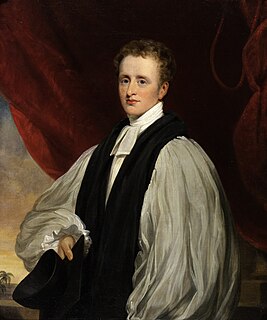
"Holy, Holy, Holy! Lord God Almighty!" is a Christian hymn written by the Anglican bishop Reginald Heber (1783–1826).

A hymn tune is the melody of a musical composition to which a hymn text is sung. Musically speaking, a hymn is generally understood to have four-part harmony, a fast harmonic rhythm, and no refrain or chorus.
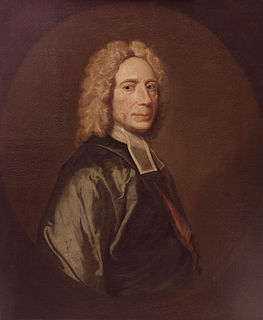
"Our God, Our Help in Ages Past" is a hymn by Isaac Watts in 1708 that paraphrases the 90th Psalm of the Book of Psalms. It originally consisted of nine stanzas; however, in present usage the fourth, sixth, and eighth stanzas are commonly omitted to leave a total of six. In 1738, John Wesley in his hymnal, Psalms and Hymns, changed the first line of the text from "Our God" to "O God." Both Watts' wording and Wesley's rewording remain in current use.

"Praise to the Lord, the Almighty" is a hymn based on Joachim Neander's German hymn "Lobe den Herren, den mächtigen König der Ehren", published in 1680. John Julian in his A Dictionary of Hymnology calls the German original "a magnificent hymn of praise to God, perhaps the finest creation of its author, and of the first rank in its class."
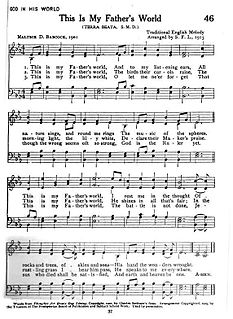
"This is My Father's World" is a well-known Christian hymn written by Maltbie Davenport Babcock, a minister from New York, and published posthumously in 1901.
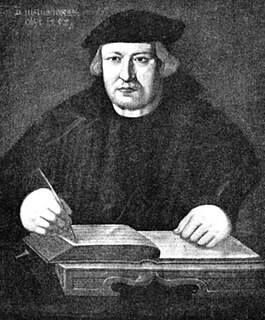
"Wo Gott der Herr nicht bei uns hält" is a Lutheran hymn by Justus Jonas, a paraphrase of Psalm 124 in eight stanzas. It was first published in 1524 in the Erfurt Enchiridion. The theme of the psalm is the need of help against raging enemies. It has been translated also as "Where the Lord God does not stand (stay) with us", "If God the Lord is not with us", "If God the Lord is not on our side", among others.

"Du meine Seele singe" is a hymn in German by Paul Gerhardt, a paraphrase of Psalm 146. Johann Georg Ebeling wrote the well-known melody in 1666. The song in 10 stanzas was first published in 1667 in the collection Pauli GerhardiGeistliche-Andachten of songs by Gerhardt. It is No. 302 in the current Protestant hymnal Evangelisches Gesangbuch.
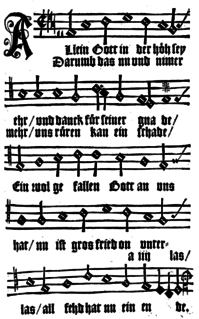
"Allein Gott in der Höh sei Ehr" is an early Lutheran hymn, with text and melody attributed to Nikolaus Decius. It was intended as a German version of the Gloria part of the Latin mass. Decius wrote three stanzas, probably in 1523, while a fourth was added probably by Joachim Slüter.

"In dich hab ich gehoffet, Herr" is a Lutheran hymn in seven stanzas, written by Adam Reusner and first published in 1533. He paraphrased the beginning of Psalm 31. It was first sung to the melody of a Passion hymn. The melody connected with the hymn in 1560 was derived from models dating back to the 14th century. A third melody from 1608 became a hymn tune for several other songs and translations to English. In the German Protestant hymnal Evangelisches Gesangbuch, the hymn appears as EG 257 with the second melody. Johann Sebastian Bach used the second and third melodies in chorale preludes, and the third also in cantatas and the St Matthew Passion.
















